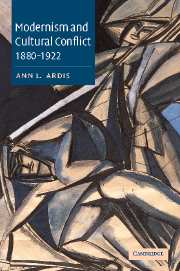Book contents
- Frontmatter
- Contents
- Acknowledgments
- Introduction: rethinking modernism, remapping the turn of the twentieth century
- 1 Beatrice Webb and the “serious” artist
- 2 Inventing literary tradition, ghosting Oscar Wilde and the Victorian fin de siècle
- 3 The Lost Girl, Tarr, and the “moment” of modernism
- 4 Mapping the middlebrow in Edwardian England
- 5 “Life is not composed of watertight compartments”: the New Age's critique of modernist literary specialization
- Conclusion: modernism and English studies in history
- Select bibliography
- Index
2 - Inventing literary tradition, ghosting Oscar Wilde and the Victorian fin de siècle
Published online by Cambridge University Press: 22 September 2009
- Frontmatter
- Contents
- Acknowledgments
- Introduction: rethinking modernism, remapping the turn of the twentieth century
- 1 Beatrice Webb and the “serious” artist
- 2 Inventing literary tradition, ghosting Oscar Wilde and the Victorian fin de siècle
- 3 The Lost Girl, Tarr, and the “moment” of modernism
- 4 Mapping the middlebrow in Edwardian England
- 5 “Life is not composed of watertight compartments”: the New Age's critique of modernist literary specialization
- Conclusion: modernism and English studies in history
- Select bibliography
- Index
Summary
The best thing for everybody now is to forget all about Oscar Wilde, his perpetual posings, his aesthetical teachings and his theatrical productions. Let him go into silence, and be heard from no more.
Echo (1895)Curiously enough, in light of literary modernists' demonization of the Webbs for the latters' presumed indifference to the arts, Beatrice Potter Webb keeps perfect company with the likes of T. S. Eliot, Ezra Pound, and Virginia Woolf in observing the silence about Oscar Wilde advocated by the Echo in 1895 – and preserving it for twenty-odd years. In one sense, Webb's failure to mention Wilde even once in any of her writings is entirely in keeping with her complete silence on contemporary socialist writings about art, as noted in Chapter 1. Still, it is hard to imagine now how and why a woman with her commitment to diary- and letter-writing could have failed to register any response whatsoever to one of the key events of her time. Webb's silence roars.
Of course, silence, as Foucault has taught us to understand, is “less the absolute limit of discourse” than “an element which functions alongside the things said.”
There is no binary division to be made between what one says and what one does not say; we must try to determine the different ways of not saying such things, how those who can and cannot speak are distributed, which type of discourse is authorized, or which form of discretion is required in either case. […]
- Type
- Chapter
- Information
- Modernism and Cultural Conflict, 1880–1922 , pp. 45 - 77Publisher: Cambridge University PressPrint publication year: 2002



